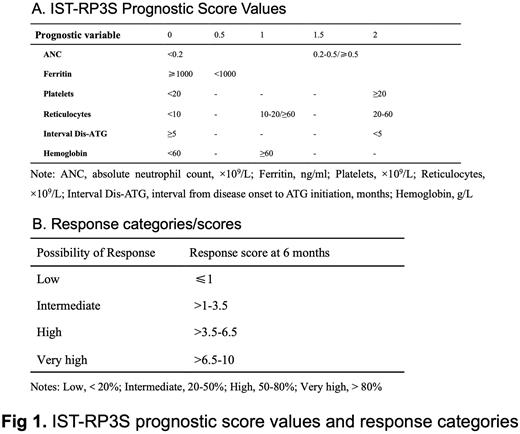Abstract

Immune-mediated destruction of hematopoietic cells has been regarded as the pathogenesis of acquired aplastic anemia (AA). It is a rare and potentially fatal disease that characterized by pancytopenia and hypocellular bone marrow. Front-line treatment for severe AA (SAA) is bone marrow transplantation with sibling donor or immunosuppressive therapies (IST) composed of antithymocyte globulin (ATG) and cyclosporine (CsA). Despite multiple studies report prognostic factors of AA to IST, there is no scoring system that enable clinicians to quantify the patient's indicators to assess his benefit after IST.
To setup a system of predicting IST response, data from 1706 SAA patients who received IST as first-line treatment in Blood Diseases Hospital, CAMS, were analyzed. Data for external validation comes from Department of Hematology of Peking Union Medical College Hospital, CAMS. This study was approved by the Institutional Review Board and were done under the principles of the Declaration of Helsinki. A global analysis was performed, and critical prognostic variables were evaluated to generate a consensus scoring system to predict hematologic response at 6 months. Thirteen categorized variables were tested using univariate analysis, and 10 major candidates having impact on IST response were further tested using multiple variate analysis. Six variables including interval from disease onset to ATG initiation, absolute neutrophil count, hemoglobin level, reticulocyte count, platelet count, and ferritin level were remained in final predicting system (Fig 1). External verification further supported the system.
In conclusion, the IST-response predicting scoring system for SAA (IST-RP3S) provides the first attempt to evaluate short-term response to IST. This predicting system should be useful for more precise treatment choice and analysis of therapeutic trials in AA.
Disclosures
No relevant conflicts of interest to declare.
Author notes
 This icon denotes a clinically relevant abstract
This icon denotes a clinically relevant abstract
Asterisk with author names denotes non-ASH members.


